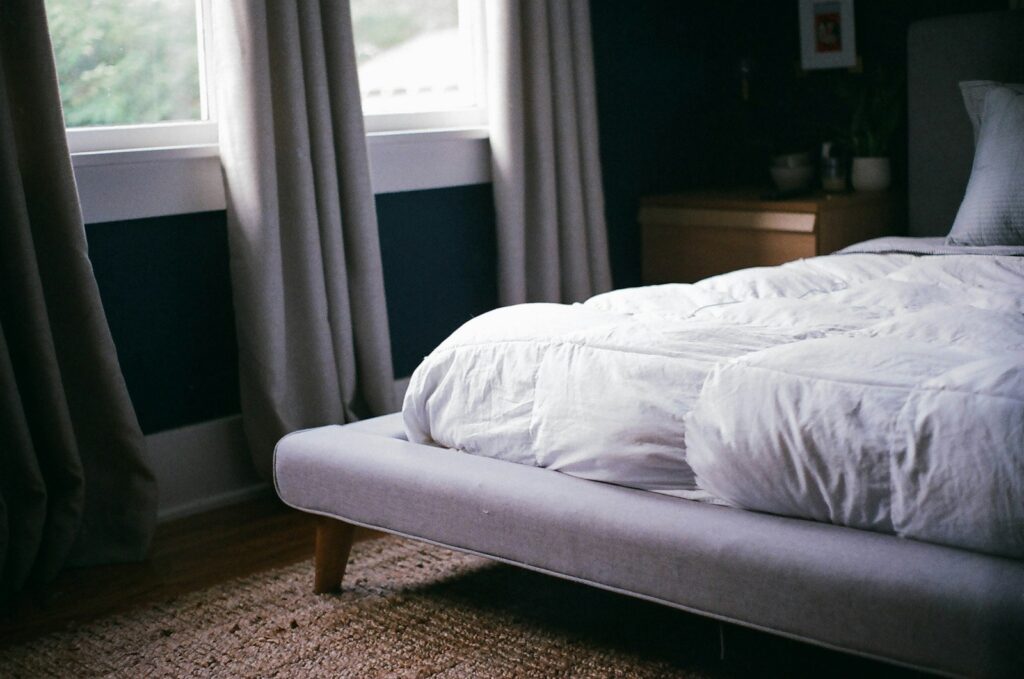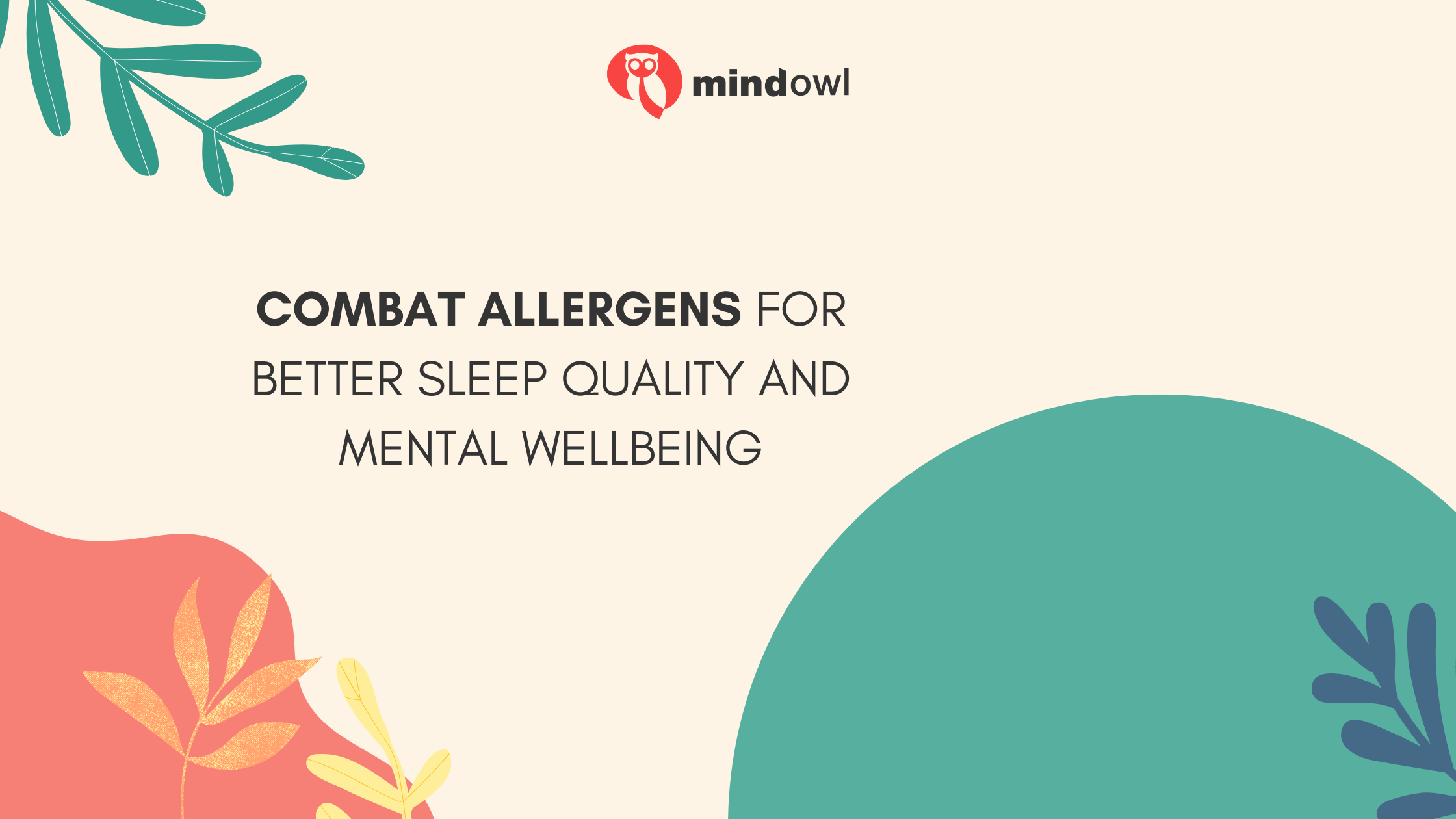If you’re turning and tossing at night, it might not just be stress or a bad mattress. Believe it or not, the real culprit affecting your sleep could be tiny unwelcome guests lurking in your bedroom.
Yes, we’re talking about common allergens like dust critters, fur from pets, and even mould—tiny but mighty foes that can turn what should be a restful haven into a battleground for those with asthma or allergies. A significant number of people find their allergy symptoms spike specifically during the night-time hours. This isn’t random chance; it’s because our bedrooms often harbour these allergens in high concentrations.
This article is your ally in the fight for better slumber and improved mental well-being. We’ll walk through clear steps to declutter your sleeping area from allergens and share some proven tricks to upgrade your sleep environment dramatically.
Key Takeaways
- Cleaning your bedroom often, including vacuuming and dusting, removes allergens like dust mites and pet dander.
- Washing bedding in hot water weekly kills off allergens.
- Use hypoallergenic materials for your mattress, bedding, and curtains to keep allergies away.
- Keep pets out of the bedroom to lower the chance of allergic reactions during the night.
- Improving air quality with purifiers and keeping rooms cool and ventilated aids in better sleep.

Identifying common bedroom allergens
Identifying common bedroom allergens is crucial for improving sleep quality and mental wellbeing. Dust mites, pet dander, and mold are typical culprits that can significantly impact your health.
Dust mites
Dust mites love to live in warm places like our beds, furniture, and carpets. These tiny creatures feed on the skin flakes we shed every day. They can cause sneezing, asthma, and even eczema in some people.
Keeping these areas clean is key to fighting off dust mite allergies.
Reducing exposure to dust mites improves sleep quality and wellbeing.
To tackle dust mites, you need a good cleaning routine. Use special covers for your mattress and pillows that keep them out. Wash your bedding in hot water every week. Vacuum carpets with double-layered microfilter bags or HEPA filters regularly to catch as many of them as possible.
These steps make your bedroom a place where you can breathe easier and sleep better at night.
Pet dander
Pet dander comes from the skin that pets shed. It’s not just the skin itself causing troubles, but also the proteins found in it. These tiny bits can float around in your bedroom air for much longer than you’d expect because they’re so small and light.
Knowing this makes it clear why keeping animals out of where you sleep matters a lot for people with allergies.
Cats and dogs let off more than just fur; their saliva, sweat, and even urine can spread allergens around your home. This might sound surprising, but cat allergens are especially sticky due to being present in their spit.
Different animals have varying levels of these allergy-causing proteins. Some may cause few or no symptoms at all, offering hope to pet lovers who still want to share a home with their furry friends without sneezing through the night.
Mould
Moulding in your bedroom is bad for your health. It releases substances that make you feel sick. These can cause sneezing, a runny nose, and even make asthma worse. Mould loves damp places, so it grows well in bedrooms if they’re not kept dry.
Keeping mould away improves how well you sleep at night. Exposure to mould doesn’t just lead to sneezing or coughing; it also affects sleep quality more than we might think. This happens because breathing in mould spores during the night can keep disrupting your sleep, leaving you tired the next day.
For people with allergies or asthma, this impact is even bigger—making their symptoms much worse at night when trying to rest.
Steps to combat allergies in the bedroom
Regularly vacuum and dust to remove dust mites, pet dander, and other allergens. Wash bedding frequently to keep it free from allergens. Use hypoallergenic materials for bedding and furniture.
Keep pets out of the bedroom to minimise exposure to allergens.
Regularly vacuum and dust
Vacuuming your bedroom once or twice a week keeps dust mites, pet dander, and other allergens low. It’s like giving your room a fresh start every few days. For those with allergic rhinitis, vacuuming the mattress daily can make a big difference.
This simple step reduces the weight of dust and cuts down on allergy symptoms.
A clean room equals better sleep.
Next, don’t forget to wipe surfaces and objects in your bedroom often. Dust collects everywhere – on nightstands, shelves, and even picture frames. Use a damp cloth to catch and remove dust without spreading it into the air.
Improving air quality in this way helps you breathe easier at night, making for restful sleep that improves both mind and body health.
Invest in a quality mattress and pillows
Investing in a quality mattress and pillows plays a vital role in promoting better sleep quality. A medium-firm mattress provides the right support for your back and ensures proper spinal alignment, which is crucial for a restful night’s sleep. Look up local mattress retailers Virginia on any popular search engine to find a variety of hypoallergenic options that suit your needs.
Quality mattresses are designed to last between 5 to 8 years, so replacing them within this timeframe is recommended for optimal comfort and support. Similarly, high-quality pillows contribute to proper neck alignment, reducing discomfort and enhancing overall sleep efficiency….
Sleep experts emphasise that investing in a good mattress can significantly improve your physical health as well as mental wellbeing…
Wash bedding regularly
Wash your sheets, pillowcases, and blankets once a week in hot water. Experts suggest using water that’s at least 54°C. After washing, dry them on a hot cycle to kill off allergens.
This step is key for getting rid of dust mites and pet fur that gather in your sleeping area.
Keeping your bedding clean helps you breathe easier at night. It cuts down on sneezing and coughing caused by allergies. Clean bedding leads to better sleep quality and boosts your mental wellbeing.
Make sure every wash follows these guidelines to keep allergies at bay and ensure a good night’s rest without disruptions.
Use hypoallergenic materials
Switch to hypoallergenic materials in your bedroom to fight allergies. These include special mattresses, bedding, and curtains that don’t let allergens stick around. Experts have found that using these materials can really help reduce symptoms for people with asthma and allergies.
It’s because they are made in a way that dust mites, pet fur, and mould find hard to penetrate.
Air purifiers also play a big role here. They clean the air as you sleep, capturing tiny particles you might breathe in otherwise. This means less sneezing and itching at night, leading to better sleep quality.
Making these changes doesn’t just improve how you feel physically but boosts your mental wellbeing too by ensuring more restful nights.
Keep pets out of the bedroom
Keeping pets out of the bedroom is key to fighting allergies. Pet hair and skin flakes can trigger allergic reactions, making it hard to sleep well. If you have a dog or cat, make sure they have their own sleeping area away from yours.
This will cut down on pet dander in your space.
Reducing exposure to animal dander helps manage symptoms for those with sensitivities. It also lowers the risk of picking up parasites from your pets, which could disturb your rest even more.
For everyone’s health and comfort, create a pet-free zone where you sleep. This simple change can lead to better nights’ rest and fewer allergy issues.

Use blackout curtains
Block out unnecessary light and reduce exposure to outdoor allergens by using blackout curtains. This can contribute to better sleep quality by creating a darker and more soothing environment for your bedroom.
Blackout curtains have been proven to be effective in improving the overall quality of sleep, especially when you need to rest during daytime hours or if you’re sensitive to light.
Additionally, they serve as a solution for combating allergies, as they can prevent pollen and other outdoor allergens from entering your sleeping space.
Keep bedroom cool and well-ventilated
Ensure your bedroom is cool and well-ventilated to improve air quality. This can enhance oxygen levels, leading to better sleep. Research suggests that increasing ventilation in bedrooms enhances sleep quality as well.
Allowing fresh air circulation creates a relaxing environment for better sleep, promoting mental wellbeing and overall sleep health.
Adequate ventilation in your bedroom fosters conducive conditions for healthier sleep patterns and improved cognitive function during the day. It also helps minimise exposure to indoor allergens such as dust mites, mould, and pet dander which can negatively impact sleep quality and exacerbate allergic symptoms throughout the night.
Conclusion
Combatting allergies in your bedroom is crucial for improving sleep quality and overall mental wellbeing. Identifying and minimising common allergens such as dust mites, pet dander, and mould can significantly impact your sleep.
Taking steps to create a clean and allergen-free sleep space, combined with other strategies like using blackout curtains and investing in quality bedding, can help you achieve a better night’s rest.
By prioritising the reduction of indoor allergens in your bedroom, you can create an environment that promotes restful sleep and supports your mental health.
FAQs
1. Why do my allergies get worse at night, affecting my sleep?
It’s not just your imagination! Allergies really can worsen at nighttime. This happens because pollen and other allergens settle in your room and on your bedding during the day. Then, when you lie down to sleep, you’re right in the midst of them.
2. How can allergic reactions impact my mental wellbeing?
Lack of sleep from allergies isn’t just about feeling tired. Poor sleep quality over time can lead to more serious issues like anxiety and depression. It affects both physical and mental health by reducing your overall quality of life.
3. What steps can I take to improve my bedroom for better sleep?
First off — keep those windows closed to stop pollen from coming in! Washing sheets regularly in hot water also helps remove allergens that have built up over time; consider using dust mite-proof covers for pillows and mattresses too.
4. Can special bedding help with nighttime allergies?
Hypoallergenic bedding is designed to resist common allergens like dust mites and pet dander; it’s a game-changer for many people with allergic diseases such as asthma or rhinitis.
5. Should I see a doctor if my allergies disrupt my sleep?
Yes, consulting with an expert is always a good idea if home remedies aren’t cutting it or if you suspect something more serious like obstructive sleep apnoea might be happening alongside your allergies.
6 .Are there any tools or devices that could help me combat bedroom allergens effectively?
Air purifiers are brilliant tools here — they work by filtering out pollen, dust mites, and other airborne irritants from the air inside your room before they have a chance to trigger symptoms during rest periods.
MindOwl Founder – My own struggles in life have led me to this path of understanding the human condition. I graduated with a bachelor’s degree in philosophy before completing a master’s degree in psychology at Regent’s University London. I then completed a postgraduate diploma in philosophical counselling before being trained in ACT (Acceptance and commitment therapy).
I’ve spent the last eight years studying the encounter of meditative practices with modern psychology.

